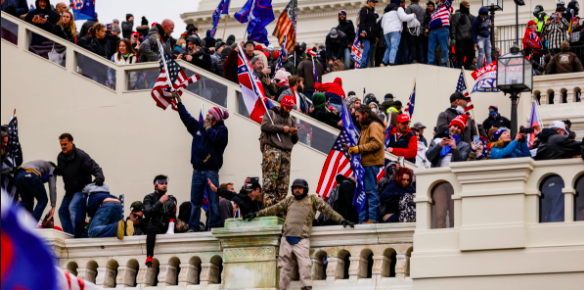
Feb 16, 2021 | School News, Sidebar News
By Kate Marine (III)
On the morning of January 7th, Upper School students were given the opportunity to attend various processing sessions via Zoom in response to the unprecedented events that occurred at the US Capitol Building the previous day. Among these sessions was a news brief, also via Zoom, from Mr. Matt Honohan. It aimed to give students and faculty some guidance in understanding what exactly transpired at the Capitol, and how our country came to such a point.
Mr. Honohan is a faculty member of the Upper School History Department, where he currently teaches World History 10, as well as three sections of AP Government and Politics. “I have a real passion for our country, and for our political system,” Mr. Honohan said, regarding his position as a government teacher, “so what I really enjoyed about [the news brief] was [bringing] a slice of what I do in AP Gov to the student body as a whole.” The session’s goal was to give both students and faculty a better sense of the country’s current situation, with the hope that understanding this event would be the first step towards processing it. With all the chaos that has accompanied the 2020 US election, Mr. Honohan especially wanted the talk to address a central question: how did we get here? “We wanted students to have a better chance of understanding why we had such chaos in the Capital, and [of understanding] some of the legal and constitutional reasons why things got so messy by January 6th,” Mr. Honohan said.
In terms of its impact on the Upper School community, the news briefing on January 7th was successful and received positive feedback from both students and faculty. “Before, I had a cursory understanding [of the January 6th events],” Leon Zhou (III) said, “but after attending the briefing I had a much more detailed understanding of the events that happened, and ones leading up to them.”
Although we hope that the events of January 6th will never have to repeat themselves, Mr. Honohan stresses the importance of staying politically engaged in the world around us. “One of the things I particularly love about teaching government is [that] it is, in a fundamental way, citizenship training,” Mr. Honohan said. “Everybody in the school is going to be eighteen soon and voting.” For that reason, although he does not expect students to “be massively politically engaged,” Mr. Honohan hopes that events like the storming of the Capitol can demonstrate to students the very real and immediate consequences of politics affecting the country as a whole. “It’s easy to live life from crisis to crisis, but the challenge is to develop a degree of consistent engagement,” Mr. Honohan explained. “I hope [these events] spur students to be more consistently engaged in the world around them.”
In such unstable times, events like the ones of January 6th can easily seem scary and overwhelming to the average newswatcher. It is for this reason that staying educated is so important to processing the events both individually and as a community. “The events of January 6th and [similar] events will only drive us apart using fear and political divide,” Zhou said. Unless, of course, we bridge that divide with political awareness and common understanding — perhaps that bridge is the one thing we can keep stable amidst a turbulent year for our country.
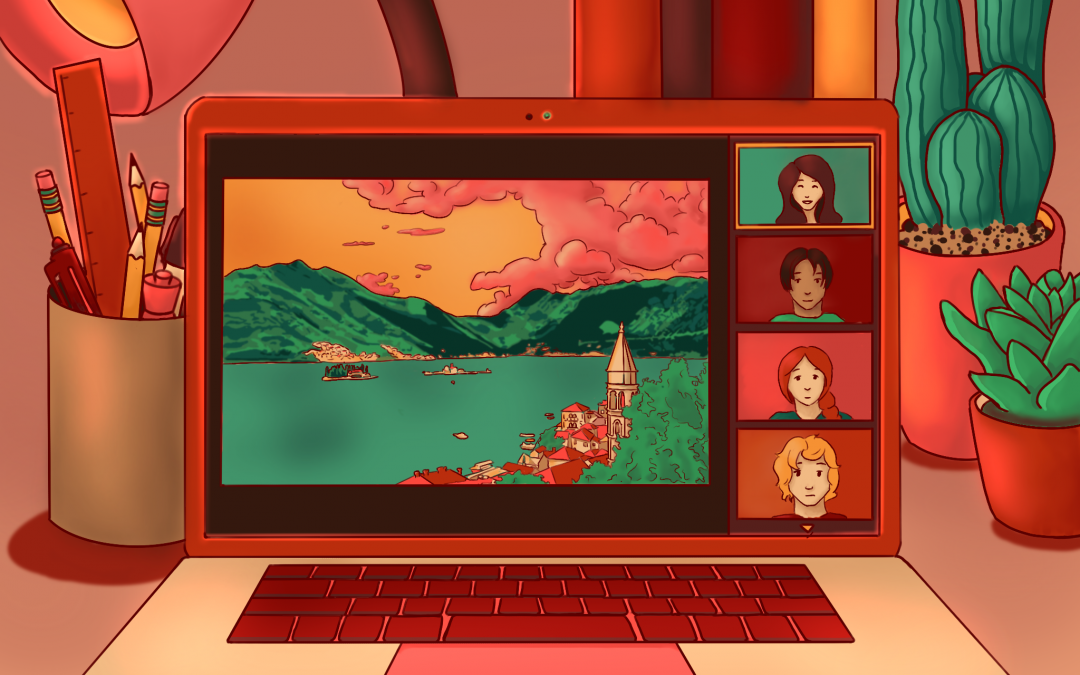
Feb 16, 2021 | Mirika Jambudi, Sidebar News
By Mirika Jambudi (IV)
Over Winter Break, students were given the opportunity to participate in Pingry’s first ever virtual Global Program. Ms. Julia Dunbar, Director of Global Education and Engagement, and Dr. Megan Jones, History Department Chair, worked together to convert this Global Studies Program into a three-day virtual course with the help of Atlas Workshops.
This program was based on the previous Global Studies Program, “Nations at a Crossroad: Nationalism and Religion in the Balkans,” which was a thirteen-day travel course. In that course, students visited areas of Croatia and Bosnia and Herzegovina, learning about the Yugoslav Wars and the underlying nationalist strife that caused the regional divisions.
In this year’s virtual recreation of the trip, students were able to meet and speak with actual residents of the countries. Many shared that these conversations were one of the most valuable aspects of the Program. For three hours each morning, from December 21st through 23rd, Pingry students dove into the history and politics of the former Yugoslavia, meeting and interacting with locals, participating in group discussions and activities, and ultimately working towards an answer to the overarching essential question, “What makes a nation?”
Ms. Dunbar and Dr. Jones remarked that they were very pleased with the virtual program. Although the “power of in-person travel is irreplaceable,” the Global Education and Engagement Department hopes to offer more virtual courses to Pingry students as “a complement to [Pingry’s] travel programs.”
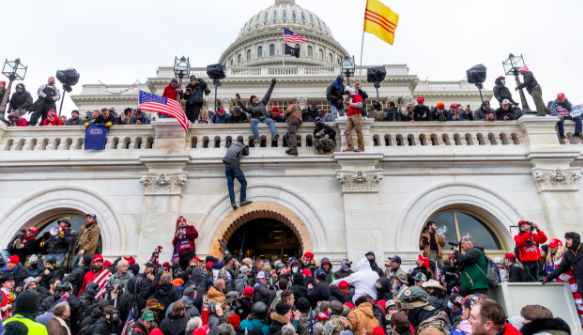
Feb 16, 2021 | Sidebar News
By Sophia Lewis (V)
On January 6, supporters of President Donald Trump gathered in Washington, D.C., to protest the Congressional certification of the 2020 presidential election. Following the rally, a group of rioters stormed the Capitol Building. Four rioters and one Capitol Police officer died as a result of this assault.
The protestors had arrived in D.C. bearing signs and wearing shirts that read “Trump 2020” and “Stop the Steal.” After initially protesting outside the White House, they were greeted by President Trump, who demanded that Vice President Mike Pence and other members of Congress seek to overturn the election results. Following Trump’s speech, the rioters pushed through a barricade and stormed the Capitol. They broke windows, released chemical gas in the hallways, and vandalized congresspeople’s offices, most notably that of House Speaker Nancy Pelosi. Some even made it into the House Chamber, where one rioter stole a lectern. The Capitol had to be evacuated, and pictures of congressmen and congresswomen hiding between seats in the Chamber quickly circulated.
The riot, which was broadcasted on nearly every news outlet, left many people in the Pingry community feeling shocked, appalled, and angry. That night, as Congress resumed the vote count, Head of School Matt Levinson emailed the community, condemning the riot and discussing the Honor Code in the context of American democracy. “The concepts embodied in [the Honor Code] are timeless, particularly…working for the common good rather than solely for personal advantage.”
It was then announced that there would be two processing sessions to be held the next day during the first two class periods. The sessions welcomed hundreds of Pingry students and faculty members, and even as Zoom calls capped at 400 participants, community members listened in through phone calls and FaceTime. There were a multitude of emotions during these sessions. Many students were angry and upset, with a few close to tears. Some chose to share their personal experiences, while others chose to listen. Many students’ common frustration was the Capitol Police’s lack of response to the rioters in comparison to their response to the Black Lives Matter protests that took place over the summer, where swarms of guards lined the Capitol steps. Many students also expressed disgust over Confederate flags and anti-Semitic articles of clothing (such as a “Camp Auschwitz” sweatshirt) making it into the Capitol.
In addition to the processing sessions, there was another session held by Mr. Honohan, where he provided students with an overview of the events leading up to January 6, to help them understand why and how the riots occurred. He also discussed the constitutional issues surrounding the election and why President Trump had called for his supporters to protest in D.C. on January 6. Mr. Honohan stated that he “hope[d] that by providing background information, students would feel better equipped to process the events that occurred.” During CP, Mr. Levinson held separate meetings with upperclassmen and underclassmen to share his thoughts on the event.
Overall, many in the Pingry community were pleased with the swift response. One thing that stood out was that, even during normal class time, teachers chose to bring up the subject and give students a space to process the event, showing the solidarity we have as a community.
Dec 10, 2020 | Clubs, Mirika Jambudi, School News, Sidebar News
By Mirika Jambudi (IV)
On November 20, Pingry students participated virtually in the Princeton Model Congress (PMC), originally scheduled to be held in Washington, D.C. PMC, the oldest model congress in the country, provides students the unique opportunity to learn about and experience the American legislative process.
Unlike most Model Congress conferences, PMC is unique in that students are not assigned a member of the U.S. House of Representatives or Senate to represent at the conference. Instead, students arrive at the conference with pre-written bills, which they then debate and amend in their committees, with the ultimate goal of passing them. Students can write bills on any topic that falls under their committee’s scope and take whatever stance they would like in the discussions.
Despite the virtual format, students engaged in extensive policy debate and ultimately walked away with a greater understanding of the process that goes into passing legislation. Vared Shmuler (IV) stated that he “had lots of fun, despite the virtual format.” Olivia Roure-Singh (IV) said that “though this was [her] first conference, it was still a very engaging and informative one.”
A special thanks goes out to Dr. Megan Jones and Dr. Gillian Johnson for organizing and coordinating Pingry’s participation in the virtual conference, especially in the midst of all the scheduling changes.
Ultimately, the conference was a success for Pingry students. They were able to participate in a lively and exciting weekend filled with lots of debate, and they are looking forward to returning (hopefully in-person) to Princeton Model Congress next year.
Dec 10, 2020 | Arts, School News, Sidebar News
By Sophia Lewis (V)
This year, the Pingry Drama Department put on a successful Fall production, albeit in a different format due to COVID-19. Almost, Maine, by John Cariani, was picked for this year because of its format of nine small vignettes, which allowed for socially distant rehearsals. A play “for romantics, not for sentimentalists,” each of the segments is about love in its many different and sometimes comedic forms. All nine scenes take place in the town of Almost, Maine at 9:00 PM. Themes such as new love, marriage, and even the ending of a relationship are explored. Because of COVID-19, the stage directions calling for kissing, hugging, and handholding were off limits. So, throughout the play, the cast sought to answer a crucial question: How do we show love for someone during a pandemic?
Many other changes were made due to pandemic restrictions. For example, rehearsals were done primarily outside with masks on and with a limited number of people. Additionally, scenes were filmed before the dates of the live performances in the event that the school had to go remote. Unfortunately, the actual play was not on the Macrae Stage, but was instead performed outside in the middle of the Student Village. The set and tech crew had to assemble the set outside and then manage the tech equipment while protecting it from the elements. This included cold and rainy weather, with the stage freezing over halfway through opening night.
Despite the restrictions, the experience was still an enjoyable one for everyone involved. Cast member Grace Stowe (IV) stated that “doing Almost, Maine was one of the best decisions I’ve made this year- it was so wonderful to be able to connect with people during the pandemic.” Ronan McGurn (IV) agreed, saying: “It was pretty poggers [slang for amazing].” Student Director Anna Stowe (V) said that she was “beyond happy to be working with everyone because everyone worked so hard and never gave up hope even when we didn’t know if school would stay open.”
Thankfully, Almost, Maine was able to go forward as an in-person performance, and ended up a huge success. One audience member remarked, “I was blown away with the amount of commitment it took from both students and faculty to produce such a thought provoking show during a pandemic” and that “it was very enjoyable to watch as an audience member.” Not only was it a success, it was also COVID-safe; not a single member of the cast tested positive for or was contact traced for COVID-19 during the duration of rehearsals and performances. Senior class member Lily Arrom (VI) said that “even though I missed performing in Macrae, doing the show outside was actually really enjoyable, and I will definitely cherish my time spent performing at Pingry.”
Dec 10, 2020 | School News, Sidebar News
By Rohan Prabhu (V)
On November 13, 2020, both in-person and remote students tuned in to watch the annual John Hanly Lecture on Ethics and Morality. With the unfortunate passing of Mr. Hanly in August, it was only proper that this year’s lecture would honor its namesake and Pingry’s former headmaster.
Mr. Levinson prefaced the lecture with a few remarks about Headmaster Hanly’s impact on the Pingry community; he mentioned that “[Mr. Hanly’s] leadership helped to shape Pingry . . . and [he] is remembered most for his commitment to ethical and moral education . . . as he expanded the scope of our Honor Code.”
Pingry also invited Mr. Al Romano, a former Drama Department chair, to speak to Mr. Hanly’s importance to the community.
Mr. Romano’s speech was a strong testament to Mr. Hanly’s focus on morality and virtue, as he highlighted Mr. Hanly’s philosophy on running Pingry. Mr. Romano, noted “[Mr. Hanly] placed in the hallway a bench, where he could often be seen sitting, chatting with students.” This gesture reflects Mr. Hanly’s emphasis on connecting with Pingry students.
Drawing on an end-of-year speech made by Mr. Thomas Keating, Mr. Romano recalled Mr. Hanly’s public speaking skills. Mr. Keating explained that Mr. Hanly’s emphasis on a positive teacher-student relationship empowered teachers to continue their work, even as summer vacation approached; this quality made Mr. Hanly a masterful teacher. In addition, he led an annual tradition of reciting “A Child’s Christmas in Wales” by Dylan Thomas to help alleviate the stress of college admissions and more. As a tribute to Mr. Hanly’s legacy, Mr. Romano recited this poem himself.
Following Mr. Romano’s remarks, a panel of students from the Middle School student government and the Upper School Honor Board were invited to the stage. These students read messages from former students of Mr. Hanly’s during his time as Head of School. Each of the messages reflected on Mr. Hanly’s morality; one note, read by Olivia Telemaque (V), shared a fond memory: “Mr. Hanly was an inspirational leader of Pingry. During my difficult first year at college, Mr. Hanly sent a letter from Pingry with a quote from an educator, regarding struggle and character. I wrote to Mr. Hanly explaining how his letter touched me deeply. He wrote back a kind and encouraging letter. I kept his letters in my desk drawer throughout college and medical school as inspiration and encouragement,” Jong Yung shared.
The 2020 Hanly Lecture on Ethics and Morality highlighted Mr. Hanly’s role in Pingry’s growth, as he helped sculpt the school into what it is today. The Pingry community is forever indebted to his work, and both Mr. Romano’s speech and the messages shared by alumni are a tribute to his long-standing impact on Pingry.
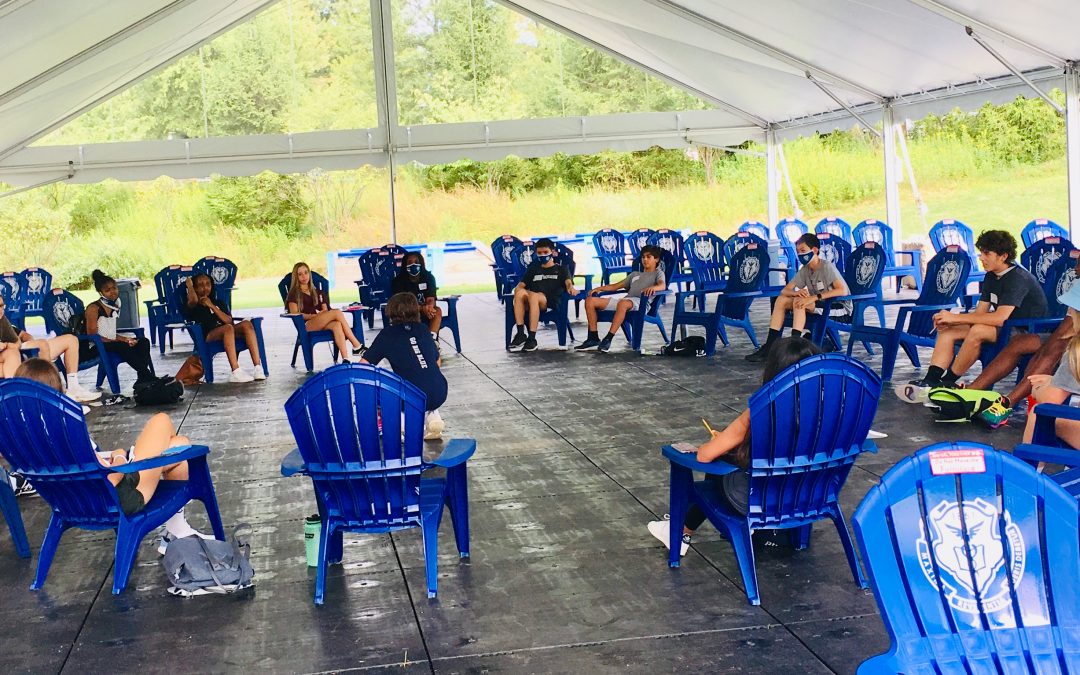
Nov 11, 2020 | Mirika Jambudi, School News, Sidebar News
By Mirika Jambudi (IV)
In place of traditional class trips this year, each form in the Upper School had a special orientation day the week before school started. These orientations started with briefings on Pingry’s new safety procedures and were followed by a team bonding activity centered on diversity and inclusion.
Afterwards, students spent time with their advisory groups and reconnected as a grade in the new Pingry “Student Village” tents. Spikeball nets and ping pong tables were also set up, such that students were able to mingle with each other outdoors in a safe and distanced manner.
Traditionally, Form III students would go on an overnight retreat in Pennsylvania with their peer leaders to bond as a grade. However, this year, they stayed on campus at Pingry, participating in back-to-school safety procedures and spending time with their peer groups. “Despite the unusual circumstances, [the] peer leaders did try to make it a fun day for us all, with activities like UNO, icebreakers, and Jeopardy,” Divya Subramanian (III) said.
The way the Pingry community has adapted during these times is an example of our resilience and commitment to the Honor Code. The administration and students put in a lot of effort to ensure that the events ran smoothly and everyone stayed safe. Even though orientations and class trips were not the typical experiences students have had in the past, students could still catch up with other members of their grade while also having some time to relax and enjoy the last week of summer before the start of school.
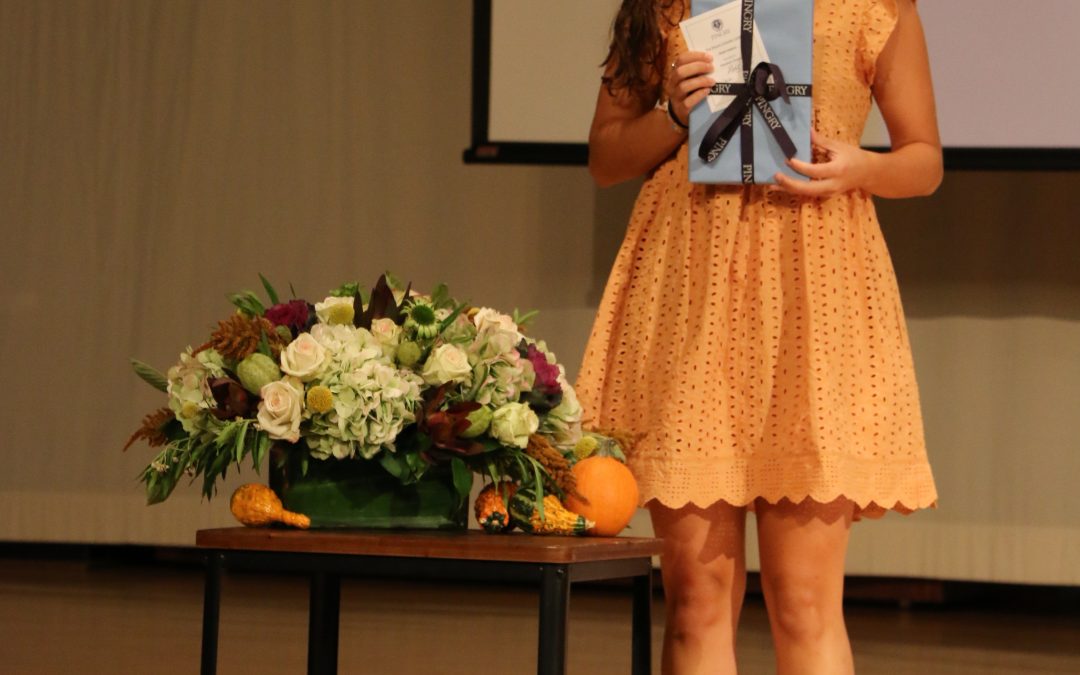
Nov 11, 2020 | Mirika Jambudi, School News, Sidebar News
By Mirika Jambudi (IV) On Wednesday, September 30, the Upper School gathered together in Hauser and over Zoom to celebrate student achievements and exceptional academic effort in the 2019-2020 school year.
The ceremony started with recognizing the Form VI students who were distinguished for their scores on last year’s PSAT/NMSQT exam by the National Merit Scholarship Program. This year, thirty-three Pingry students were named National Merit Commended Students, a significant increase from last year. A total of fifteen seniors were recognized as National Merit Semifinalists, allowing them the chance to advance in the selection process and potentially become finalists in the spring. These seniors were Noah Bergam, Joseph Castagno, Monica Chan, Zara Jacob, Rhea Kapur, Aneesh Karuppur, Dean Koenig, Jemma Kushen, Julian Lee, Justin Li, Guanyun Liang, Helen Liu, Katherine Overdeck, Eva Schiller, and Avidan Shah.
Following these distinctions, Upper School Director, Ms. Chatterji, presented the Citizenship Prize, which is given to one student in each grade who best represents the Honor Code’s spirit. Afterward, the Faculty Prize was awarded to students who showed dedication and commitment to their school work during the past academic school year. Finally, the Scholarship Prize was awarded to the student(s) with the highest GPA in each grade.
Next, seniors excelling in math and science were recognized with awards from the respective department. The Rensselaer Mathematics and Science Award and the Whitlock Prize for Math were among some of the awards given.
As per tradition, Mr. Levinson and Dr. Dinkins went on to present the College Book Awards. Each award is given to a senior class member who best meets the selection criteria provided by the particular college. Brown, Columbia, Cornell, Dartmouth, Mount Holyoke, Penn, Princeton, Smith, Wellesley, Williams, and Yale were represented this year.
On behalf of the English Department, Dr. Dickerson announced the winners of the annual Justin Society writing contest. Students submitted their entries last spring, which the English Department then reviewed. Writers and poets from each grade received awards for their creative writing, poetry, memoir, and more.
The annual Fall Awards ceremony is a celebration within the Pingry community of student achievement, excellence, and honor. It serves to recognize the efforts that every individual puts into school every day. The Pingry community looks forward to another year of student achievement and hard work, and congratulates all the students honored at the ceremony.
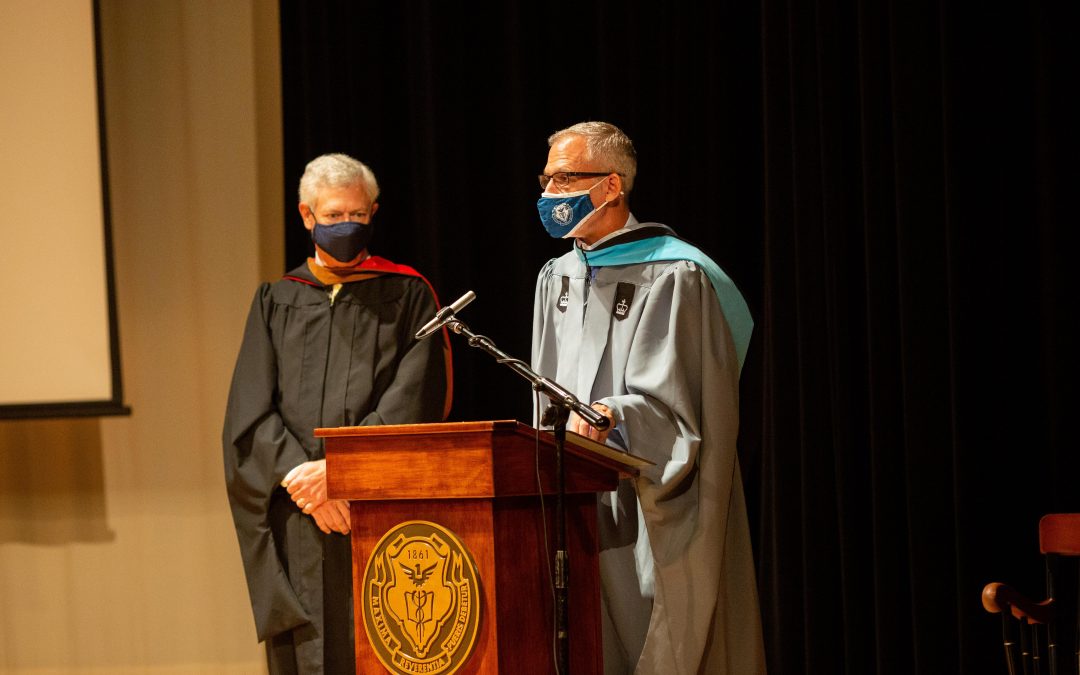
Nov 2, 2020 | Front Page News, School News, Sidebar News
By Emily Shen (V)
One of the most memorable and cherished traditions at Pingry is Convocation, a ceremony marking the school’s commitment to the Honor Code and a kick-off to the academic year. It was started in 1987 by Mr. John Hanly, the headmaster from 1987 to 2000. Mr. Hanly’s passing this year is a considerable loss, and Head of School Mr. Levinson acknowledged his significant impact on Pingry.
Each year, students arrive at the auditorium in formal attire, sitting alongside their peers and teachers. However, due to new social distancing measures only seniors could be seated in Hauser. Other students and faculty members watched the ceremony remotely, either in their advisory locations or at home. Senior faculty member and Magistri Mr. Miller Bugliari ’52 delivered the invocation, emphasizing that this year is a year of “testing” — a test of our community’s determination, resolve, and will.
After Mr. Bugliari, Student Body President Nolan Baynes (VI) lightened the mood by telling the Pingry community about a movement he started called “#respectfulsnowday,” an Instagram hashtag that demanded for snow days in a “polite” manner. However, the movement halted when it shifted from a hilarious tradition to serious conversations with Mr. Jake Ross, former Dean of Student Life. Although the fire of his first social media movement was extinguished, Baynes used that experience to fuel another one. Baynes spoke up about the racial injustices in the country, specifically the murders of Ahmaud Arbery, George Floyd, and Breonna Taylor. In contrast to #respectfulsnowday, this story stemmed from genuine concern, confusion, and pain. When he expressed these emotions to the Pingry community, he found immense support in meetings, emails, and messages between the school’s leadership and students. This time, supportive actions were taken; Baynes emphasized the importance of voicing one’s genuine concerns and speaking out against injustice to spark change. The Honor Code teaches us that it is our responsibility, as members of the Pingry community, to use our strengths to create substantial impact and stand up for what is right.
The next speaker, Honor Board Chair Meghan Durkin (VI), began her speech by describing a news broadcast, which consists of 25 minutes of news and a kicker: a 5-minute positive bookend that leaves viewers “a sweet taste in their mouth to walk away with.” Although this year has felt like the negative news of the first 25 minutes, Durkin argued that we are now at the kicker, where the Pingry community has the opportunity to “redefine and bolster our values.” This year, the Honor Code is growing with the community to create a positive and compassionate environment; when there are challenges or obstacles, the Pingry community still upholds the Honor Code’s fundamental values of honor and integrity. At the end of Durkin’s speech, advisory and Honor Board representatives from the Middle and Upper School came to the stage to present Durkin and Baynes with copies of signed pledges that affirmed the students’ commitment to the Honor Code.
Then, Board of Trustees Chair Jeff Edwards ’78, P ’12, ’14, ’18 delivered his speech; he used Einstein’s saying of “in every difficulty lies opportunity,” but one’s mindset determines if a situation is one or the other. Despite the unpredicted difficulties, what lies at the heart of Pingry remains unchanged — our support and care for one another. He encouraged the students to approach the difficulties with an open mindset and an opportunistic outlook.
Mr. Levinson then recognized the twenty-five Magistri faculty members, who have served at Pingry for at least 25 years. He recounted a story about flat tires, highlighting the importance of seizing opportunities to learn from and understand each other.
Following Mr. Levinson’s remarks, members of the Pingry community joined together to listen to, and hum, “Old John Pingry.” As students and faculty exited Hauser and their advisory locations, each community member was reminded of our community’s values and traditions.
Nov 2, 2020 | Featured, Meghan Durkin, School News, Sidebar News
By Meghan Durkin (VI)
This year’s freshman retreat, held on Thursday, September 3, kicked off an unprecedented school year. Instead of visiting Bryn Mawr Mountain Retreat as originally planned, this year’s retreat was held at Pingry to respect coronavirus guidelines. Although masks and shields brought an unusual element to the retreat, the goal of the day remained the same: provide freshmen an opportunity to interact with their classmates, as well as their peer leaders, before the official start of the school year.
Leading up to the retreat, this year’s 36 peer leaders met to prepare during a retreat of their own. They participated in bonding activities, found out who their co-leader was, and created various icebreaker activities for the freshman. Typically, the freshman retreat is planned by Bryn Mawr; however, this year, the activities were left to the peer leaders. As a group, they brainstormed ideas such as “icebreaker UNO” and Jeopardy.
With all that preparation, Thursday kicked off with a quick coronavirus safety briefing by Mr. Graham Touhey and an introduction to the peer leaders. Then, each peer group, consisting of about eight freshmen and two seniors, went off to get to know each other. Each group did their own activities, from charades and kickball to Jenga and “Shark Tank.”
The day did bring many new challenges, as this was the largest number of students on campus since March. Peer leader Zara Jacob (VI) described these difficulties: “There were quite a few bumps and some moments where the last thing I wanted to do was talk with my mask on, but I still got to meet my freshmen in-person. I got to know them on a level you just can’t through a screen.”
Like many others, Jacob was able to make the most of the day, even though it was different than anticipated. Her favorite activity was the peer leader hunt: each peer group and one of their leaders used clues to find the other leaders hidden throughout the building and campus. “When I was with my peer group, we were all just walking together, listening to music, and talking,” Jacob recalled.
Throughout the day, the peer groups also competed in a TikTok challenge. These videos had to reflect how they hoped to be defined as a group; at the end of the retreat, all the TikToks were viewed in Hauser and voted on. Ultimately, this challenge allowed the groups to explore their creativity and work together.
While this year’s retreat still allowed freshmen an opportunity to get to know each other, the traditional overnight retreat was missed by all. Ms. Lorian Morales, one of the peer leadership advisors that helped plan the retreat, acknowledged those disappointments: “Having that time away together, whether it’s on the bus, walking the trails, sharing meals, or hanging out in the cabins, allows students the opportunity to interact at their own pace in a relaxed environment.”
However, the retreat’s unusual elements brought many positives as well, as the Pingry community finally came back together. “Watching the day unfold put me at ease. Students were back on campus, making new friends, reconnecting with old friends, and just enjoying each other’s company,” Ms. Morales said.







